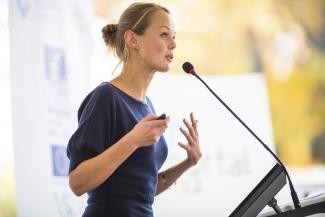
Do the preparation task first. Then listen to the audio and do the exercises.
Preparation
Transcript
When I was at university, I did a business course that covered advertising, marketing, sales and public relations. I'm really glad I did this particular course as, although it was vast, it gave me an overview of business in general and the different careers in communications.
While I was studying, I realised that I was most interested in public relations, and so I joined a couple of associations so I could start networking before leaving university. Through one of the organisations I joined, I was able to meet lots of experienced professionals, who gave me advice on getting into the industry. I was also offered an internship in my final year. This meant I could build up my portfolio even before I'd finished studying. I think that it's extremely important, especially today when there are so many people wanting to work in PR, to do an internship to a) get a foot in the door and b) have more on your CV than simply your studies. You have to show willing and prove that you're an enthusiastic, ambitious person who wants to succeed. It was hard studying and working at the same time, but at least it prepared me for the deadlines and long hours you're expected to put in with a PR job.
My internship also meant that I built up a list of contacts in the media and PR industry itself. Both areas were very important in helping me get my first job as an account co-ordinator with a corporate public relations agency. I had to write and proofread flyers, keep track of media databases and other admin-type stuff. It wasn't the most exciting of jobs, but at least it gave me a better insight into PR and helped me decide what I wanted to do after. I didn't have much journalism experience either before working for this company, so I learned that as I went along.
After about nine months, when I felt ready to tackle something a bit meatier, I applied for a job, still within the same company, with more responsibility. I became an account executive and very quickly felt at home in my new job. That was about two years ago. I've much more contact with our clients and I play a large role in developing public relations strategies. I still do a lot of writing with press releases, but I'm also more involved in organising special events like press conferences.
I love what I do because I get to meet loads of different, interesting people every day. You have to be quite outgoing and able to communicate easily, which I guess is more of a talent than a skill. If I had to start again I'd choose to do a journalism option at university, as employers like you to have a journalism background. Otherwise, getting an internship was the best thing I've ever done and I'd do it again, no problem.




I'm not really interested in working in public relations, working in a such field, needs someone to be more outgoing person, wich is considered as a talent or a personality character more than a skill, but i would like to develop my network by meeting experienced professionals
Why can you not print off the activities? On the listening and writing, you can.
Hello ufuoma1989,
I'm sorry that there are no worksheets in the Podcasts for professionals section. Creating these has been on our to-do list for a long time, but we have been very busy working on other projects and this has left us without enough time to do it.
We do plan to create worksheets one day, but in the meantime, as long as you acknowledge that it was created by the British Council, you are welcome to copy the transcript and exercises in to a document and use that.
All the best,
Kirk
The LearnEnglish Team
Quite an interesting podcast. I can only express my admiration. I agree with the statement “The ability to communicate is more of a talent than a skill,” and I think this is so. Indeed, after listening to the podcast, there are many thoughts that you need to start thinking about the future in advance and look for an opportunity that would help in the future.
Hello anuru2015
When you want to drop a sentence in a new position, you have to click or press on the small white hand (on the right) of the sentence that is in new position.
Does that make sense? It's easy to do but a little difficult to explain, so if you'd like me to describe how to do it again, please let us know.
All the best
Kirk
The LearnEnglish Team